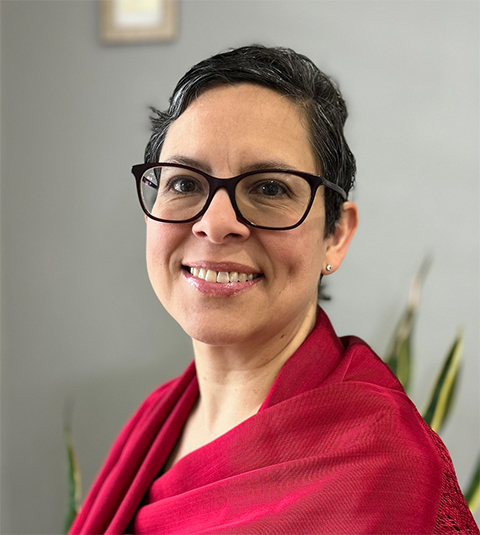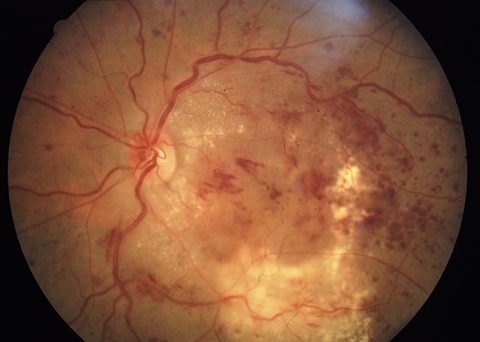
Swapping stethoscope for pipette to understand diabetic retinopathy
Emma M. Lessieur Contreras grew up in El Mante, Tamaulipas, Mexico, a rural township where residents farm sugarcane. The local diet is derived largely from this crop, resulting in high rates of diabetes.
As the community's only ophthalmologist, Lessieur Contreras' father treated many patients with diabetes-related vision problems. This inspired Lessieur Contreras to embark on a professional journey that took her from ophthalmology-focused medical studies in Mexico to diabetic retinopathy research in the United States.

Lessieur Contreras earned her M.D. from the Universidad Autónoma de Tamaulipas. After her father's unexpected death, she moved to the U.S. looking for better opportunities to financially support her family. While overcoming the dual challenges of mastering English and validating her Mexican medical degree, she was a clinical research fellow, at the University of Texas Health Science Center at Houston, working mainly with retinal specialists.
"They were participating in the Diabetic Retinopathy Clinical Research Network, or DRCR.net, so I enrolled in those projects and moved more into the field of diabetic retinopathy," she said.
She passed the U.S. Medical Licensing Examination and moved to Ohio, where she had a clinical fellowship at the Cole Eye Institute of the Cleveland Clinic. Her job involved enrolling study patients for clinical protocols at the institute, and she also started assisting with basic research.
"I got hooked on basic research," she said. "I started learning and spending more time in the lab than in the clinic. So, at one point, and with Dr. Bela Anand-Apte encouragement, I decided to hang up my white lab coat and stethoscope ... and then I picked up the blue coat and the pipette."
After earning a Ph.D. in molecular medicine with an emphasis in ophthalmology at the Cleveland Clinic Lerner College of Medicine of Case Western Reserve University, Lessieur Contreras began a postdoctoral fellowship at the University of California, Irvine under the supervision of Timothy Kern, who seeded her with self-confidence and courage to pursue her dream in becoming an independent investigator. Now she focuses on the immune system's role in diabetic retinopathy.
This research was the foundation of her application for a Maximizing Opportunities for Scientific and Academic Independent Careers, or MOSAIC, award. The American Society for Biochemistry and Molecular Biology MOSAIC program, funded by the National Institutes of Health, provides two years of postdoctoral funding, followed by three years of R01-level funding to launch an independent faculty career. Her MOSAIC research project focuses on how extracellular vesicles, or EVs, from the diabetic neural retina, affect the immune system.

"It is very striking to me," Lessieur Contreras said, "the different processes that occur in the retina, such as those related to the visual cycle, somehow affect the immune system. It is a distant communication — how does it occur?"
Her research has shown that EVs from mice that are pharmacologically altered to have diabetes can trigger immune cells in nondiabetic mice, inducing retinal endothelial cell death and potentially leading to capillary degeneration, which is characteristic of early diabetic retinopathy.
These results challenge the conventional view of diabetic retinopathy as a primarily vascular disease, suggesting treatment could target neurovascular interactions and immune modulation.
Lessieur Contreras is also an advocate for diversity in science, technology, engineering and mathematics, mentoring a new generation of Chicanx/Latinx students at UC Irvine with a program called the Chicano/Latino Staff Association.
She balances her research career with a family life that includes three children and a husband, Hugo Paz y Mar, who is active in academia and clinical practice.
"Keep dreaming" she advises.
Enjoy reading ASBMB Today?
Become a member to receive the print edition four times a year and the digital edition monthly.
Learn moreGet the latest from ASBMB Today
Enter your email address, and we’ll send you a weekly email with recent articles, interviews and more.
Latest in People
People highlights or most popular articles

Building a career in nutrition across continents
Driven by past women in science, Kazi Sarjana Safain left Bangladesh and pursued a scientific career in the U.S.

Kiessling wins glycobiology award
She was honored by the Society for Glycobiology for her work on protein–glycan interactions.

2026 ASBMB election results
Meet the new Council members and Nominating Committee member.

Simcox wins SACNAS mentorship award
She was recognized for her sustained excellence in mentorship and was honored at SACNAS’ 2025 National Conference.

From humble beginnings to unlocking lysosomal secrets
Monther Abu–Remaileh will receive the ASBMB’s 2026 Walter A. Shaw Young Investigator Award in Lipid Research at the ASBMB Annual Meeting, March 7-10 in Washington, D.C.

Chemistry meets biology to thwart parasites
Margaret Phillips will receive the Alice and C. C. Wang Award in Molecular Parasitology at the ASBMB Annual Meeting, March 7-10 in Washington, D.C.

